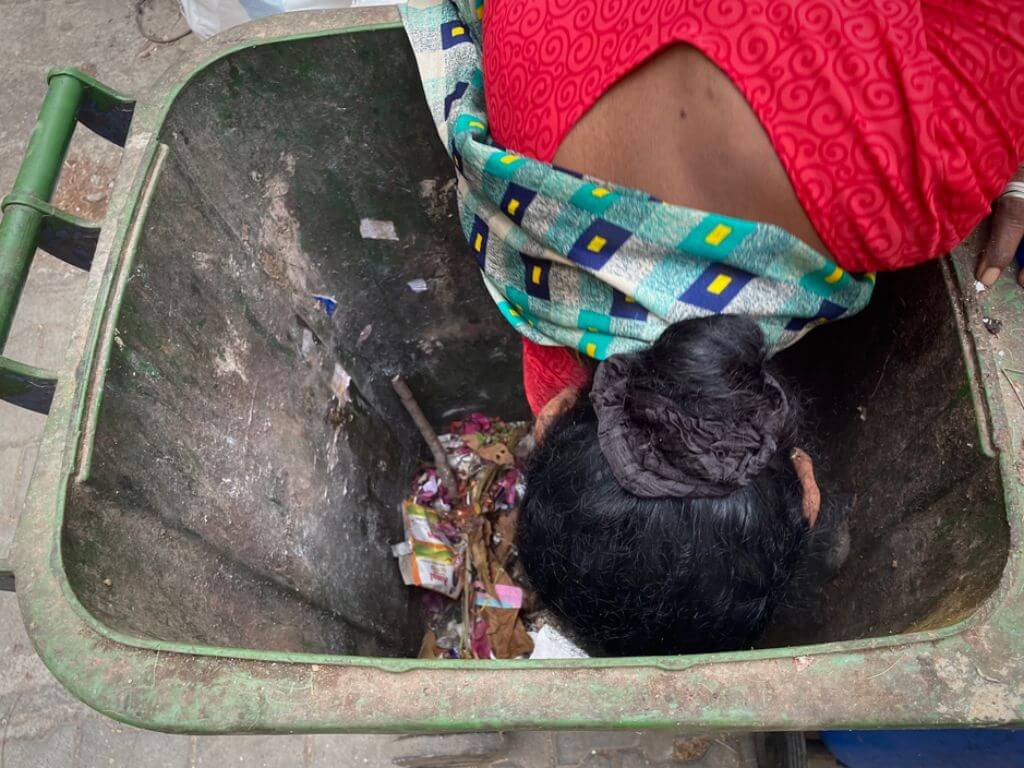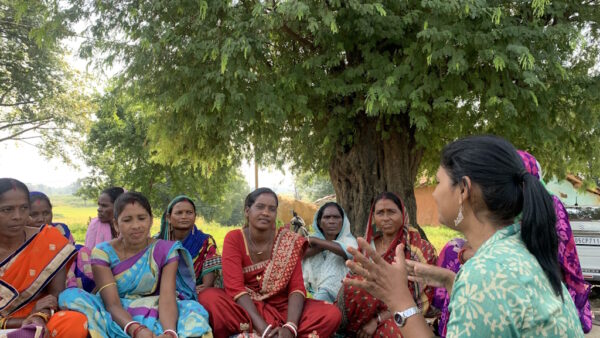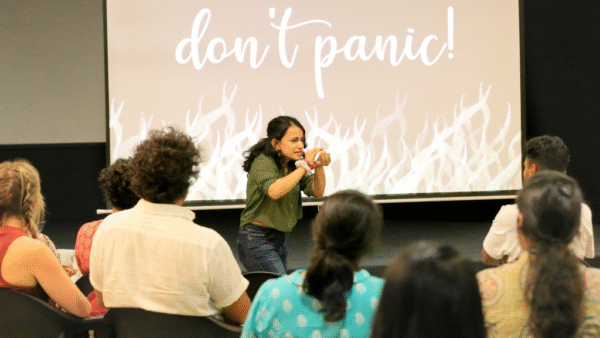Lakshmi Naidu, in her thirties, wades in knee-deep rainwater from King’s Circle in Matunga to Breach Candy in Mumbai looking for discarded waste. She sifts through heaps of garbage to segregate it – items which can be sold to the scrap dealer. When she does, she will get a paltry amount because the scrap dealer will not take wet waste; the incessant rain has had a direct impact on her work and income. However, rain or shine, she walks the long 10-kilometre distance because even a few rupees mean a meal for her and family. “I have to work even if it rains otherwise my family will be hungry,” she says.
Rajati has been picking waste, since she was a little girl of ten, around Altamount Road, known as Mumbai’s Golden Mile for its bevy of addresses of billionaires including Mukesh Ambani. She now looks after seven members of her family, who live in a small room in Worli. Although she has two adult sons, they are of no help — the eldest is an alcoholic and the younger one earns meagre sums. She could not afford to send her three daughters to school and hopes to have them married soon.
Thousands of ragpickers like Naidu and Rajati, almost all of them women from the lowest of castes, go through the same routine in different parts of Mumbai every day. They are out scrounging the roads, garbage bins and discarded waste for bottles, wrappers, and plastic, battling either harsh summer or incessant rain – every season comes with its own challenges – in order to earn Rs 300 a day, an average amount that’s also irregular.
Extreme climate events affect these vulnerable and poor women the most, throwing them literally at nature’s mercy. If their work is in the face of elements, their homes are too. Most ragpickers in Mumbai live in makeshift huts or on pavements.
Unrecognised roles
Ragpickers play a major, but usually unrecognised role, in the waste management system and saving the environment. They collect the garbage and further segregate it, which helps in the recycling process which, in turn, reduces the quantum sent to landfills; the sorted waste is taken by dealers to recycling units.[1] But the work exposes them to all sorts of injuries and ailments. In the course of picking and sorting the waste, they come into contact with glass, paper, plastics, wood, metals, and all sorts of items in these materials. Injuries are common, compounded by the lack of reliable medical care even in public hospitals or primary health centres.
Faced with the trials in the course of their work, extreme weather events pose an added challenge. Climate Change, even if they know about it, is the least of their concerns focused as they are on their next meal. The torrential rain and cyclones in the recent past have caused them loss of income and destroyed their tarpaulin makeshift homes, but most of the women did not skip work.
According to the Brihanmumbai Municipal Corporation (BMC), there are 6,605 ragpickers in Mumbai, a majority of them are women. This is the acknowledged figure; those in the field say the women workers number many times that.
Climate impact
Like other women ragpickers, Indubai and Kantabai (they only go by their first names) live at the traffic junction in Bhagat Singh Nagar, in Goregaon West suburb. The on-going construction of the metro network has left several of them without a home. They have been forced to cook, clean, and bathe in the open. Indubai stretches her arms to display the rashes and boils which she got because she has been out in the sun all day. Rajati says that she feels better outdoors during summer. “I feel breathless inside the room in the heat,” she says.
This year’s heat wave was one of the worst in the country, severely affecting the most vulnerable people, especially women. An article in The Economist reported that the “heatwaves around the world have been made more common and hotter because of Climate Change”.
In India, temperatures rose to record-breaking numbers, with March being the hottest month since 1901. This was further exacerbated along coastlines and in areas with high levels of humidity. Besides heat waves, cyclones, excessive flooding, erratic rainfall, and droughts are the effects of Climate Change in recent years in India.
“Unchecked, Climate Change will push up to 130 million people into poverty in the next 10 years,” wrote Akihiko Nishio, vice-president of development finance at the World Bank earlier this year.
The monsoon season raises the risk level – not only in the collection and segregation stages because they do not have dedicated space for segregating but also because scrap dealers refuse to pay for wet waste. They count themselves lucky to earn even Rs50 to Rs 60 a day. “We cover ourselves with plastic and roam around in the rain to collect waste. If the waste gets wet, we don’t get money,” said Vallarmati who migrated to Mumbai from Salem in Tamil Nadu after her husband died a year ago.
All appeals and protests to urge the BMC to support the women ragpickers to formalise their work and appointments have come to nothing. Back in 1975, ragpickers were organised by the Stree Mukti Sangathana, a voluntary organisation, which educated and trained them in the processes of composting, bio-methanation, micro-saving and leadership skills as a way to resist the exploitation.
The organisation has consistently argued that waste picking should be given its rightful place in the city’s economy but, as its trustee Jyoti Mhapsekar pointed out, keeping this informal and unorganised helps save the municipal corporation crores of rupees every year.[2]
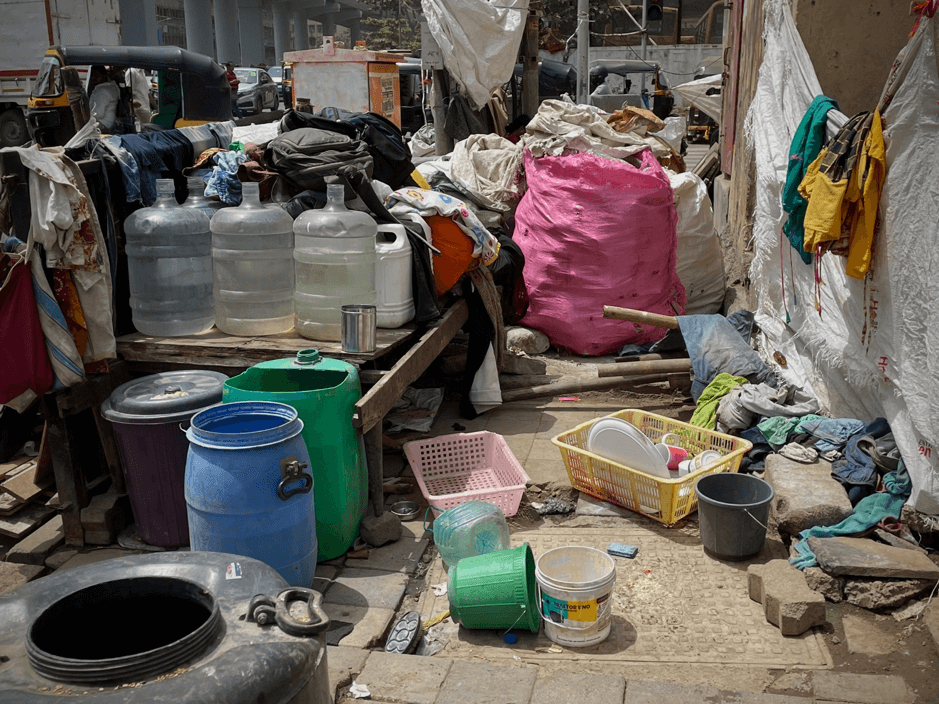
Photo: Maahi Shah
Flee from drought, but poverty persists
The women come to rag picking as migrants from villages in Madhya Pradesh, Tamil Nadu, and other parts of Maharashtra (primarily from Marathwada region) through community networks because the city offers them a chance at work and wage. A few have been living here for decades. They earn an average of Rs 300 a day, in exceptional cases Rs 500, but it is not necessary that they earn every day of the month.
Jidnyasa Arondekar More, who heads Aakar Mumbai, an NGO working for the waste picker community, with a special emphasis on women and environment justice, says most families migrated to the Maximum City as water scarcity and an unceasing cycle of droughts made farming and other agricultural activities nearly impossible and wages earned through manual labour were inadequate to feed the family.
Sarayu Kamat, head, Climate Change Initiatives at Raah Foundation, works in parched regions of Maharashtra, and has seen families in villages suffer. “In the peak of summer, women walk five hours a day for water. There is no time to earn money. The people are sucked into the vicious circle of poverty. Many of them give up, and come to the cities. They end up picking garbage or breaking stones by the roadside,” says Kamat, a former banker who now dedicates her time to environmental conservation and women’s empowerment.
With most ragpickers belonging to predominantly lower castes, waste picking becomes a hereditary occupation and children are pressed into from a young age. In the city’s waste is their wealth. Yet their livelihood, home and future remain uncertain and unpredictable. “Kachra sone ki tarah hain (Waste is like gold),” Milind Arondekar, the late founder of Aakar Mumbai, used to remark. Just as the price of gold rises and falls in the market, so does the price of dry waste. Only for them, the price of waste is not guaranteed.
One of the perils of working this way in the informal sector is the absence of a regular mechanism of payment to these workers. The municipal corporation is not responsible because it does not hire them directly; there are contractors in between. Sangeeta Hasnale, Assistant Municipal Commissioner (Solid Waste Management), says, “It is an unorganised sector, so there is exploitation of all kinds.”
Rajati recalls how she would earn a good amount of money from the waste bins kept outside Antillia, Mukesh Ambani’s 27-floor home on Altamount Road. After the waste collection was privatised a few years ago, she hardly earns anything.
The dirty picture: Meagre earning, no security
In a survey of 202 women in cities across India, Nepal and Bangladesh, more than 40 per cent said they were spending less time on their informal jobs and earning less, found HomeNet South Asia, a regional network of groups representing home-based workers[3] A
Anuradha Nagaraj writes of the rising heat waves and frequent floods which is compelling women slum dwellers to cut down their working hours.
Most women begin the day at 4am and work till 2pm collecting, segregating, and then selling the waste. Their basic expenses such as rent or protection money, buying water for their needs, and so on leave them with little to cushion their lives. Being part of the informal sector means they have no security or health insurance. Most women are the main or sole earners of their families.
“I spend Rs 5,000 to Rs 6,000 for my husband’s medicines. Even though we go to a municipal hospital, we have to buy medicines from outside,” says Rajati. Vallarmati had hoped to help her ageing parents earn a living. “We three collectively earn Rs 500 a day,” says Vallarmati, who is struggling to educate her two sons.
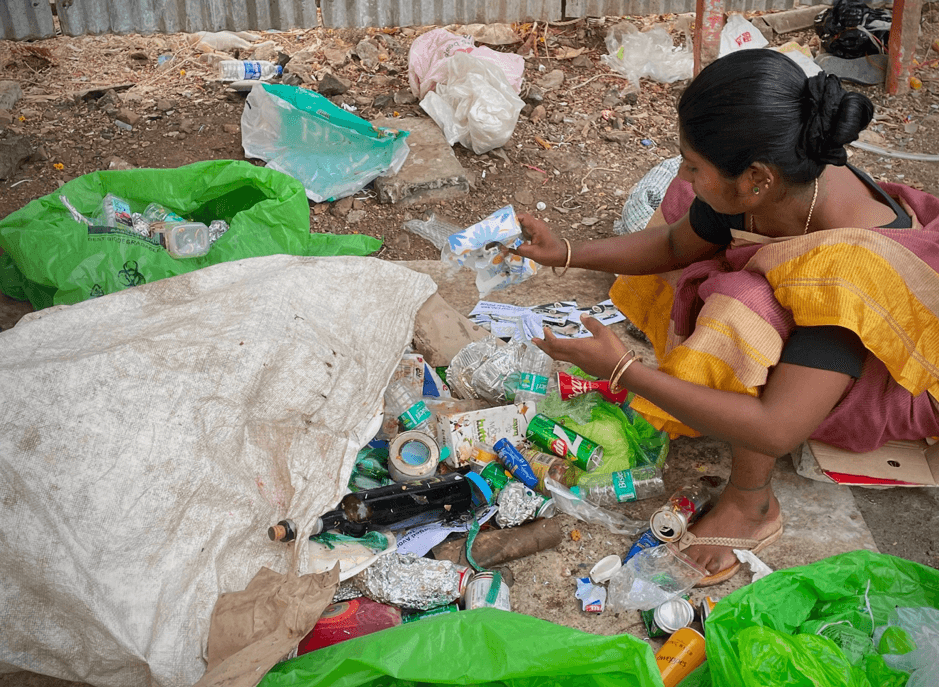
Photo: Maahi Shah
Nearly all the women ragpickers put up with the problem of alcoholism in their families. They have been beaten, harassed, and abused for trying to stop their husbands from drinking. “Men ragpickers work for only two to three hours, have food, drink and sleep,” says More.
Monica, a ragpicker, lost her husband 26 years ago to a liver condition. A few years later, her two alcoholic sons died. Since then, she has been living alone on the streets at Worli. “I am the oldest resident here,” says the 65-year-old woman, carrying nearly 80 kgs of dry waste on her back.
Mumbai has seen a rise in both the hazardous and non-hazardous waste, with a total of nearly 7,025 tonnes generated every day. Without strict implementation of waste disposal rules, ragpickers are exposed to the hazardous waste in the process of segregation. Earlier, ragpickers were often victims of tuberculosis but now they suffer from a plethora of diseases including skin allergies and respiratory ailments. Most of these women are over 50 years of age and have various health problems.
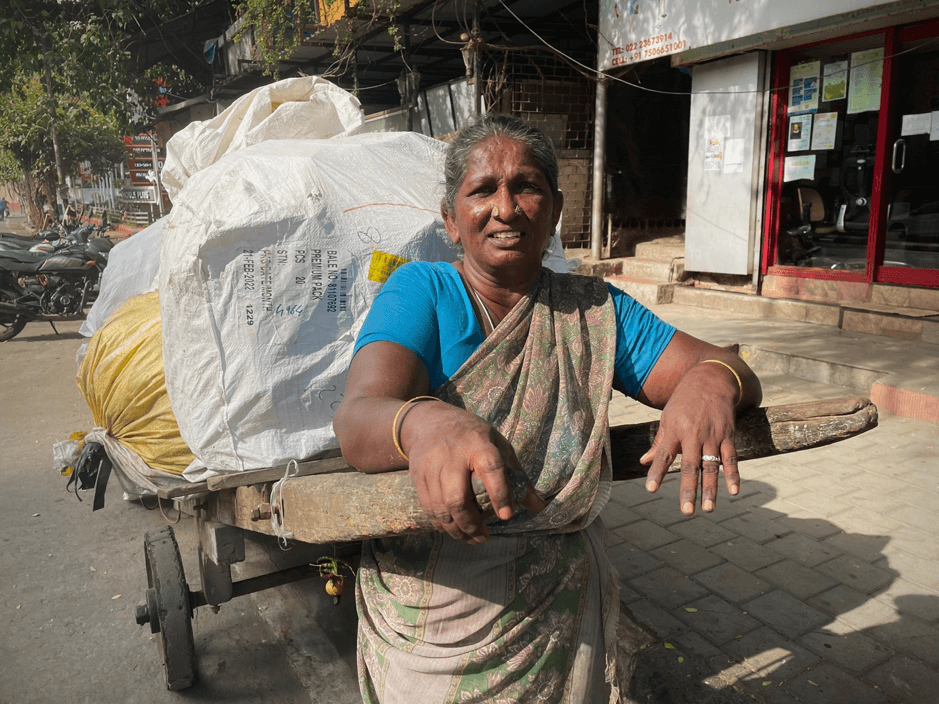
Photo: Maahi Shah
Sustainable solutions
The municipal corporation allotted Rs 4,531 crore in its last budget for waste management[4] but even a fraction of this does not trickle down to the last ones in the pecking order: Women ragpickers.
With no official documentation or count of ragpickers, and confusion in defining what exactly constitutes rag picking work, the municipal corporation gets away by not designing or not implementing policies for them. This is worsened by a lack of awareness on the part of ragpickers about their rights – or even that they are self-employed workers in the city.
Despite the odds, the women ragpickers soldier on. “My parents have taught me this. I don’t know any other work,” says Rajati. Adds Monica, “We work and feed our families so why should we be ashamed?”
Formalising their work and status would make their lives stable and allow them to access certain benefits in health and living conditions. This could increase the efficiency of the waste management system in Mumbai and also mitigate the impact of Climate Change, says the NGO workers. The registration of ragpickers can be done with the help of the NGOs which work with them.
The intersection of Climate Change, gender, poverty, and the informal nature of their work makes for a complicated situation. Each factor affects and influences the other, but the consequences are faced by the women with little skills or resources to combat them.
Maahi Shah, an Economics graduate with a post-graduate qualification in media from Sophia Social Communications Media, interested in journalism, photography, storytelling, and education. Before becoming a writer with Harper’s Bazaar and Cosmopolitan India (Digital), she was extensively involved with the Teach for India volunteer programme, and children’s theatre.
Cover photo: Maahi Shah

